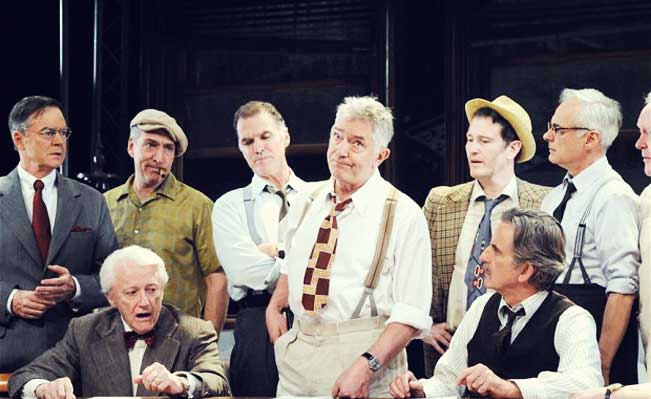 Twelve Angry Men at the Garrick Theatre. Photo: Alastair Muir
Twelve Angry Men at the Garrick Theatre. Photo: Alastair Muir
A new production of Twelve Angry Men brings out the play’s relevance to today’s issues of poverty and racism, together with how opinions can change, finds William Alderson.
When someone’s life is in your hands, your opinions matter. Twelve Angry Men is a play about twelve jurors who are deciding the fate of a man accused of murder. The defendant faces execution if convicted, and all the jurors are convinced that his guilt is obvious, except for one. The gradual process by which all twelve end up agreeing a verdict of ‘Not guilty’ is a powerful story, and the performance at the Garrick Theatre thoroughly involves the audience in the emotional struggles of the process.
The play is based on the 1957 film, starring Henry Fonda, which was itself based on a television play written by Reginald Rose after he served on a jury in New York in 1954. Reviewers have called it a ‘period piece’, or described it as ‘beginning to show its age’, as if a story set in the 1950s necessarily has no relevance to today. In fact, the reverse is the case. The issues at the heart of Twelve Angry Men are not just highly relevant, but painfully familiar.
In the play jurors condemn a whole section of the population as criminal simply because of its poverty or ethnic background, and this lays the foundation for condemning the individual defendant, a young black man from a poor area. Today more and more people have accepted the propaganda that the problems of society are the fault of the poor and of immigrants. At the same time, hysteria about child abuse and violent crime is used to push the idea that capital punishment is a solution for certain crimes. If these ideas are not corrupting juries already, how long will it be before they do? As such, the play is a warning about the future as much as about the past.
Twelve Angry Men also makes a more fundamental point. The process of change does not come from one juror confronting the others with a different or better interpretation of the evidence, and it does not come from one entrenched position winning over another. It comes from questions. It comes from the confidence to doubt and to ask if there might be another way of looking at things. It comes from sharing viewpoints.
As the jurors start to take an active role in questioning their interpretation of the evidence, so they start to provide each other with a better understanding of the case, and they start to separate truth from supposition and to isolate and reject prejudice. The embarrassment and revulsion these performers exhibit when one juror’s racial prejudice is finally fully exposed is an extraordinary moment, not least because it appears to break out into attitudes which exist beyond the confines of the story and the period of the play.
There is a sense in which the whole of the revolutionary left needs to learn from this play. It is all too easy to believe that you know the answer, but you then have nothing to offer but another version of the ‘truth’ for people to accept or reject. Having the confidence to doubt, to share doubts, and to be open to the doubts of others can be a much more powerful way of changing opinions than any certainty, no matter how well you believe it to be supported by evidence. When people question their world they start to take control of their relationship to that world and become active rather than passive.
Twelve Angry Men is not a sixty-year-old historical relic, any more that Sophocles’ Antigone is 2,500-year-old one. They are both works of art which speak about issues which have still not been done away with. Tickets are not cheap, but the performance is well worth seeing, and its success means that the run is being extended to June.
Twelve Angry Men at the Garrick Theatre, Charing Cross Road, London, WC2H 0HH

